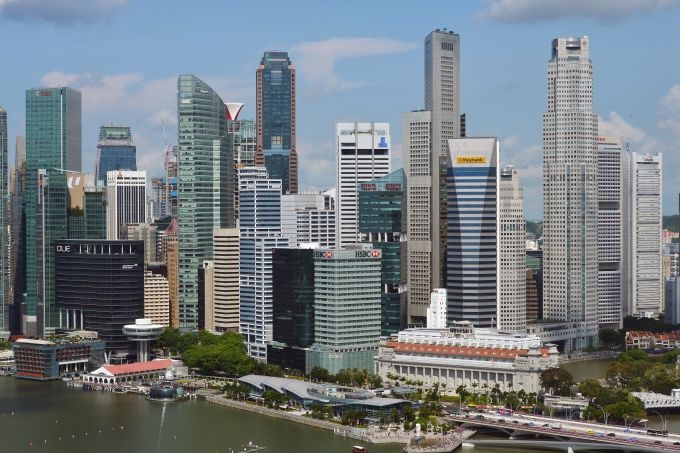Singapore's office market will never be the same again

POST-COVID-19, Singapore's workforce is adapting to the new normal of flexible working. As in other parts of the world, 2020 has laid bare some truths: office work can be done from home, and workers' wellness is indispensable to business continuity and the economy.
Just as workers expect to telecommute, businesses have started to re-design the work infrastructure to exploit the latest remote technologies for operational optimality.
For instance, at DBS, UOB and Standard Chartered, bank employees will have the option to work remotely part of the time, as with technology companies such as Google, Paypal and Fujitsu. At Microsoft, virtual teams were already prevalent prior to Covid-19. Demand for remote working from both employees and employers will likely lead to leaner office spaces with lower maximum capacity.
The new normal of working under Covid-19 is placing greater pressure on office landlords.
According to the 2020 third-quarter report of Singapore's Real Estate Sentiment Index (RESI) by Institute of Real Estate and Urban Studies (IREUS), National University of Singapore (NUS), a net balance of 69 per cent of the top real estate executives surveyed predicted a decline in market performance of the office sector and a net balance of 47 per cent of the executives surveyed expected the decline in market performance to persist till mid-2021 for the office sector.
Given that Covid-19 may likely be under control in the next two to three years when a vaccine is available, the next question is whether the trend of remote working and flexible working will continue or fade when everyone is allowed to go back to work.
Remote working has been available since the 1990s but firms had not really caught on it, and even those at the digital frontiers still like to create physical space to encourage collaboration. The office space fosters camaraderie and a sense of cultural belonging, while reinforcing authority and managing teams. This comes in a way that might be more efficient than, for example, virtual co-working or hot desking.
Then there are also the agglomeration arguments in urban economics. Co-locating with other business or industrial offices can allow a firm to benefit in terms of knowledge spillovers and pooling of production inputs, among other localisation and urbanisation economies.
This time, however, may be different. People have learnt to adapt, to socialise and get together amid safe-distancing measures. The social media platforms are replacing part of the collaboration effects of physical space. There are also anecdotal evidence that friends utilise the same meeting platforms for work to have sharing sessions ranging from yoga to cooking.
In terms of control, leaders are forced to refine business process and goals for the workers during Covid-19 pandemic. Many companies turn to workplace and project management apps to build plans and coordinate tasks.
Notwithstanding, there are risks to firms if they were to go fully into flexible-working mode. Their clients may wrongly perceive that as a sign of being not well, especially if they relinquish their physical space.
Smaller firms without dedicated IT resources have to accept a higher level of cybersecurity risk and leakage of data. Additionally, there may be a risk of productivity loss due to miscommunication of tasks and fatigue. As for employees, they may want a hybrid workplace that allows for the occasional physical separation of office from home, alongside flexible working.
A hybrid workplace will also be beneficial to the companies. Hybrid workplaces with flexible working scheme will enable firms with expiring leases to avoid overcommitting too much space amid the uncertainty.
At the same time, if the economy recovers faster than predicted, the company is able to expand easily through the flexible working scheme without increasing its physical footprint. It will also prevent the company from occupying spaces during an economy upswing when rents are a lot higher.
At the macro level, such hedging will imply there will still be leasing activity but at a lower level. The absorption of the vacant and newly completed spaces in the market is likely to take longer. Buildings, especially older ones, will face greater pressure to retain tenants and rents are expected to calibrate.
Data here also shows negative net absorptions in Singapore since Covid-19, which are the largest since 2013. Reflecting this, the rental index of office space is on a decline. The lack of new completions due to the slowdown in construction activity and the removal of Shaw Towers from the office stock did not stem the decline in rents, and it seems likely that the decline of leasing activity and commercial rents may persist in Q4.
Firms that are renewing leases are expected to be in a stronger bargaining position than before to negotiate the rents, as they have more options. Older buildings with vacant space will not only see lower rents, but they may attract firms that are downsizing. In other words, the risk of tenants not paying rents due to poor business is higher. Any new completion is likely to trigger a flight to quality for companies that are doing well.
Hence, landlords of older buildings in the central business district may be tempted to redevelop. In contrast, Grade A office buildings with customisable space are likely to be relatively more attractive, especially if they offer options for swing space such as co-working options.
With the Covid-19 situation remaining fluid, more companies are likely to adopt flexible working models to stay agile to beat the economic headwinds. There are already implications to the office market. Presuming a vaccine becomes available and the economy recovers, the current normal may be sustained by a complementary rise in better-quality home working spaces.
According to the RESI report, 92 per cent of developers expect an increased demand for dwellings conducive for working (for example, those with spaces that can be repurposed or with more rooms).
This in turn could improve the productivity and utility of working at home, and hence appetite of both employers and employees for remote working. Concurrently, office spaces are being reviewed in anticipation of fewer workers returning. As flexible working arrangements become more prevalent, the impact of Covid-19 will drastically and structurally change the office market in the short term and the long term.
- Lee Nai Jia is the deputy director at the Institute of Real Estate and Urban Studies (IREUS), National University of Singapore. Eileen Kuan is the senior research associate at the same institute. The views and opinions expressed herein are those of the authors and do not represent the views and opinions of the National University of Singapore or any of its subsidiaries or affiliates.




